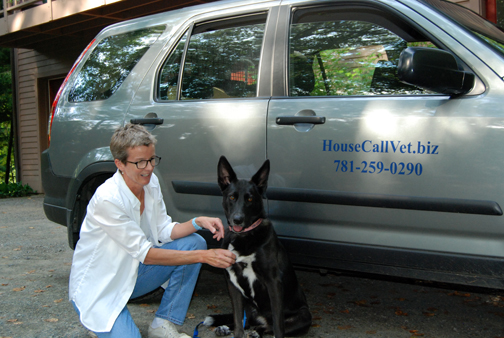By Brett Wittenberg
When they see the vet, many dogs cower, cats hide, birds screech and bang against their cages—but not when they see Dr. Betsy Johnson. Armed with a can of Cheez Whiz, catnip, and a stethoscope, she’s been healing Lincoln pets for 25 years in the setting where they’re most at ease: their own homes.
If there’s such a thing as a typical veterinarian, Johnson isn’t it. Lincoln Veterinary Services, her house-call-only practice, harks back to a time when medicine for both people and animals came to the home, conveniently and compassionately, via traveling physicians. With her bag of instruments (thermometers, syringes, scalpels and a stethoscope) and her own dog, Lucy, as her automotive traveling companion, Johnson finds no medical problem too big or too small. Like a sheriff in the Old West, she has to be prepared for anything, but instead of a six-shooter, she packs a rotary-drill nail file.
The benefits of veterinary house calls to an animal owner are many. Birds housed in aviaries can be difficult to catch and transport, animals can become too weak to move safely and without unneeded discomfort, and some clients don’t own cars or simply enjoy the convenience of having the vet brought to them.
Johnson’s desire to aid wounded and sick animals started at a young age. “Entering veterinary school had been a dream of mine since I could remember,” she said. Her choice of specialization, however, was not so clear. Visions of an equine practice went out the door with the first stallion that almost brained her in a stall. Bovine medicine seemed limited by the financial constraints of dairy farmers, not to mention the brutal hours (calves, just like people, arrive around the clock) and working conditions—cattle vets are often knee-deep in hay, mud and other things.
Her path through veterinary medicine was greatly influenced by her first job at the Windhover Bird Clinic in Walpole, Mass. First jobs can be intimidating, taking young adults out of their comfort zones, and this was no exception. “Get yourself a lead-lined bra” were the first ominous words of advice Johnson received from Windhover’s renowned Dr. Marjorie McMillan.
Early on at the clinic, where Johnson began working after after her 1985 graduation from Tufts University School of Veterinary Medicine, her veterinary fortitude was put to the test. As luck would have it, her first patient wasn’t the tiny finch or submissive parakeet she had hoped for, but an enormous blue and gold macaw. A large macaw can have a wingspan wider than Johnson is tall—almost six feet from wingtip to wingtip. Keeping an eye on the massive beak designed for crushing nuts, she gripped the squirming towel-wrapped bird while it lunged for any accessible body part on its health care provider. She gave its claws a manicure with a powerful hand-held drill, working as fast as she could and “wishing for that bra” the whole time, Johnson recounted.
For seven years, Johnson also worked for Brookline Animal Hospital and the Charles Street Clinic, learning the ins and outs of a conventional veterinary practice. But she also wanted to be a parent, so she looked for a more flexible mode of veterinary medicine. “When the time came to start a family, the transition to start a full-time house call practice for dogs, cats and the occasional bird came naturally,” she said.
After striking out on her own (and on the road), Johnson’s professional pace slowed only for a short while. When word spread that she was seeing animal patients in Lincoln, Drumlin Farm called her to treat their assorted wildlife (though her practice now is restricted to dogs, cats and birds). After she took out an ad in a local paper, her phone started ringing with Lincoln residents eager to take advantage of her services. It didn’t take long, she said, before her practice filled up with the ordinary day-to-day demands of a small animal vet—that is, if things like stitching a cat’s paw on its owner’s kitchen table can be considered ordinary.
As time went on, Johnson became known for her uncommon grace with a wrenching but unavoidable part of the job: euthanasia. When a creature’s quality of life deteriorates beyond a bearable point, Johnson takes over with finesse and compassion in a familiar setting to prevent undue stress to both owner and animal.
“I never thought of Jones as my pet. It was a blessing that he came and shared his life with me,” one client wrote to Johnson about his black-and-white cat. “He was my friend. Most people don’t get that. You are an exception.” It’s almost become a second practice for Johnson, with veterinarians from Boston and western suburbs referring her to owners of terminal patients seeking an alternative to having their pets put to sleep in an animal hospital or vet’s office.
A quarter-century after starting her unusual practice, Dr. Betsy Johnson is still one of the few house call vets in the area. She’s handled all kinds of animals and mastered the tricks of her trade—but she still carries that can of Cheez Whiz, just in case.
Brett Wittenberg is a resident of Lexington, Mass.

Leave a Reply